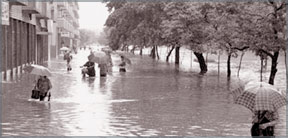North Korea pleads for aid as flooding raises fears of famine
by Richard Lloyd Parry
North Korea appealed for international aid yesterday after the worst
floods in 40 years killed hundreds of people and washed away the homes
of hundreds of thousands more.
Aid workers gave warning of a potential repeat of the famine of the
mid-1990s in which millions of people may have died after floods hit
crops.
|

Residents wade through a flooded street in Pyongyang |
Shops in Pyongyang have been flooded and private food crops have been
washed away. Representatives of the few foreign embassies in the
capital, including a British diplomat, will be taken to see the stricken
areas today in advance of what seems certain to be a request for
large-scale international aid.
The United Nations World Food Programme (WFP) received a preliminary
plea for aid yesterday after the state media reported the results of
five days of heavy rain, combined with high tides.
The Korea Central News Agency said: "The torrential rain left
hundreds of persons dead or missing and destroyed more than 30,000
houses for over 63,300 families or rendered them inundated. It also left
tens of thousands of hectares of farmland inundated, buried under silt
and washed away. The heavy rain destroyed at least 800 public buildings,
over 540 bridges, 70 sections of railroads and at least 1,100 vehicles,
pumps and electric motors."
In parts of the country as much as 672mm (261/2in) of rain fell in
the five days. "The material damage so far is estimated to be very big,"
the news agency reported. "This unceasing heavy rain destroyed the
nation's major railways, roads and bridges, suspended power supply and
cut off the communications network."
Paul Risley, of the WFP, said: "If the figures are borne out by our
assessment, then we are very concerned that this is a significant
emergency crisis."
North Korea, the last of the Cold War Stalinist dictatorships, is one
of the most isolated states in the world and is exceptionally vulnerable
to natural disaster. Flat arable land is scarce and much of the
country's food is grown on mountain slopes that have been deforested for
firewood and are easily washed away in heavy rain.
The country's economy has shrunk disastrously since the break-up of
its tight alliances with Russia and China and the aid and ready markets
that they provided.
Agricultural techniques are primitive, with inadequate drainage and
protective ditches. All this sets the scene for a repeat of the famine
of the mid-1990s, when at least 1.5 million, perhaps as many as three
million, people are believed to have died after floods compounded
already serious food shortages between 1995 and 1997.
Defectors have told consistent stories of the horrors of that time,
when corpses lay on the streets and people were forced to eat rats,
dragonflies and tree bark to survive.
Many experts will assume that figures provided by the Government
understate the true magnitude of any disaster. In floods last year, the
authorities reported 156 dead, but Dear Friends, a South Korean Buddhist
organisation with extensive contacts inside North Korea, estimated that
54,700 were dead or missing.
The Times, UK |
